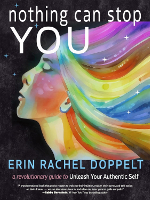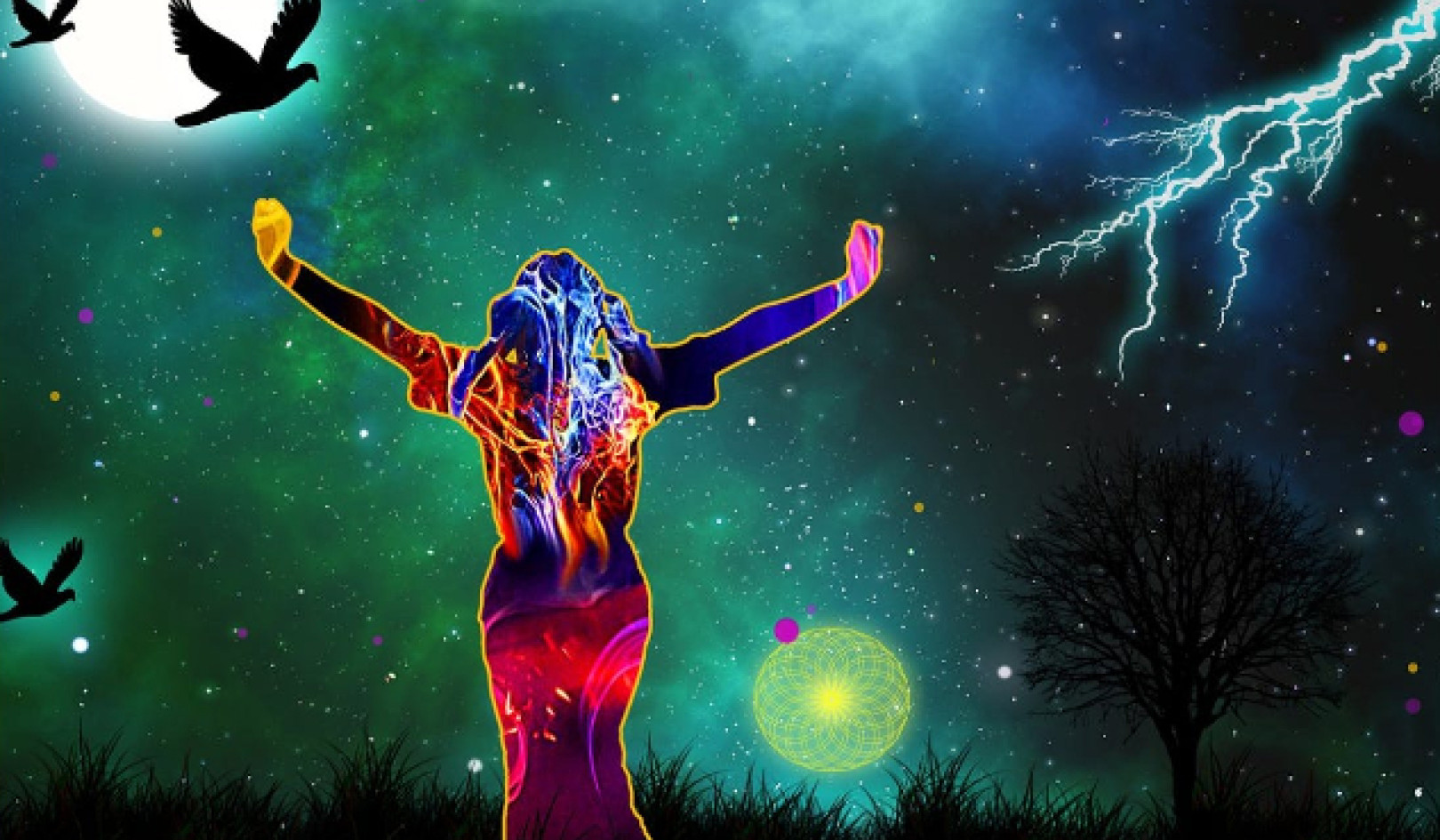
Image from Pixabay
In this Article:
- Why it's important to distinguish between a higher power and inner wisdom
- What is Hitbodedut and how can it deepen your spiritual connection?
- What are effective spiritual connection practices for everyday life?
- What is the PPP method & how can it help you find guidance?
- How can these practices support you during difficult times?

Call God What You Want, Just Call
by Erin Rachel Doppelt.
I define spiritual connection as a relationship to a higher power as you understand it. Let your connection be to God, Adonai, Jesus, Allah, the Buddha, Brahma, YHWH, Mother Nature, Gaia, spirit, energy, the Universe, your ancestors, the elements, or anything else that feels aligned with you.
We all have access to a higher power—should we desire to commune with it. Your truth about God doesn’t need to make sense to anyone else, yet it is also important for you to define it. I recommend putting a name and specific verbiage to your spiritual belief system as it defines what—or whom—you’re calling on when you desire guidance.
It is essential to understand the difference between a higher power and your own inner wisdom. The distinction between your inner Self and God is that your inner guru is your intuitive internal compass, your inner teacher, your most authentic Self at your core, your gut check. Your inner guru is also parts of your personality and uniqueness, what makes you your most authentic Self.
God, the Universe, is a higher power, an ever-present energy that you can always tap into and that is always around you. The difference can also be explored as soul (your inner light) versus energy (a universal source). Soul is within. Source is bigger than Self. You may choose to connect with your inner guru and allow it to lead you to God. Or you can let these two concepts support each other and coexist.
I have been praying since the eighth grade when my maternal grandmother passed away. No one taught me how to do it; I just learned to close my eyes and talk to my Ray-Ray and to God. I have prayed every night before sleep for nearly twenty years. It’s not just a habit—it’s part of my life, a regular devotion to stay connected to a higher power and my ancestors.
Embodiment Practice: Pause, Pray, Pay Attention
You may have done this practice before without even knowing it. This is a method of prayer you can use when you feel the intensity of a moment leading you into a negative feeling-state. This is a prayer you can use when you feel like hitting your knees, giving up, and making friends with rock bottom. Whenever you’re in a pressure-cooker situation and emotions are high, use this framework. If you can remind yourself to take a deep breath and implement this practice, you will be redirected.
Step 1: Pause.
When you feel into an intense moment, pause whatever you are doing. Move into a prostration pose (allow yourself to stretch and face toward the earth, similar to child’s pose in yoga), or move to sitting on your knees with your head tilted forward in a bow. Choose a pose that feels like surrender in your body. Take a deep breath. Sometimes I will chant “Om” three times, wash my hands, change my socks, or light a beeswax candle to differentiate this moment from all others. It is important that your pause is intentional to mark a shift in time.
Step 2: Pray.
Connect to a higher power as you understand it. Ask for what you need to feel better. This is not a time to “pray away” a bad feeling-state, but a mindful moment to come back to the present. This is a time for you to notice how you feel and to ask for a redirection. Be clear on what it is you need. You can ask for a specific thing that may help you feel safer or ask for a feeling-state of peace, clarity, alignment, or ease.
For example, perhaps you will ask to meet someone from your hometown, as you know this will make you feel safe. You could also ask to see a specific symbol that is important to you that will show you that you are protected. I always work with deer and ask to see deer, as they remind me of where I grew up in Chicago. I will say, “God, show me deer so I know I am on the right path.” (When Jon proposed to me on the scenic beach in our hometown, four deer came out of the woods to witness the proposal. Another powerful sign!)
Step 3: Pay attention.
Once you’ve paused and prayed, pay attention to the shift. If someone calls you out of the blue, pick up the phone. If someone slides in your DMs asking for support, accommodate them if it feels right to. When you ask for a symbol, make sure that you’re awake enough to see it when it comes. Be an active participant in your own life by staying alert for redirection.
Try this practice in moments that feel extreme and in moments in which you want a shift in perspective. This practice is also a self-awareness technique, whereby you can pinpoint the beginning of an emotion and redirect it before it becomes a full-blown panic attack. Your job is to remember this method in the heat of the moment.
Embodiment Practice: Hitbodedut תוּד ְדוֹבּ ְתִה -
In Judaism there is a spiritual practice called hitbodedut wherein you take time to talk out loud to God in unstructured prayer. If you are new to prayer (or if it feels foreign to you), and yet you desire to deepen your spiritual connection, try this practice. I use the term God here to reference the divine, but insert whatever higher power verbiage resonates with you.
To start, go for a walk in nature or someplace you feel safe and connected. Set the intention that you are on this walk not just to enjoy the walk, but to practice this sacred ritual.
Start talking to God in a way that feels comfortable to you. Speak from your heart. Release the need to have a beginning, middle, or end to the dialogue. Just speak your thoughts aloud. Talk for as long or as short a time as you desire.
When I learned this practice, I asked the rabbi, “Why out loud? If it’s just me and God, can’t I just speak in my mind?” The rabbi shared that when you speak out loud, you are less likely to get distracted and more likely to be present and holy with your words. When we dialogue with ourselves internally, sometimes we skip words or shift from one topic to the next or lose focus and fall asleep (if laying down). Speaking out loud keeps us present in the practice, and we use more of our senses, like hearing and speaking, to witness our experience.
Try your best to be holy with your words. Speak with precision, avoid filler words when possible, and share from a place of truth and authenticity. Assume that God knows who you are at your core, so there is no need to catch God up on what has been going on in your life. Just dive right in.
When you’ve come to a stopping point, close the practice with gratitude. Say “thank you” to yourself for showing up and to God for being your witness.
Before returning to the natural rhythm of your day, pause. Listen. Sometimes there will be a response. Be open to receiving. Take a couple deep breaths or place your hands on the earth to bring you back to a grounded headspace.
Try this out once a week or do it when you feel inspired. How does the ritual feel in your body? Over time, you will deepen your relationship with God. Remember, your work is to pay attention. The topics you discuss with God may reach a new level of understanding, or perhaps you will work out an obstacle in your life with ease. Notice the small shifts that lead to big changes over time.
JOURNAL PROMPT: Reflecting on Your Conversations with God
What is an obstacle you’re moving through that God may be able to help with? Where can you walk outside and speak aloud with no one overhearing? What insights have you gained after talking with God?
GUIDED INTEGRATION
Our inner guru is our internal compass, and God is an ever-present energy bigger than Self. These two themes work together to deepen your spiritual connection and support you in living aligned to your highest possible timeline. Take time to contemplate your connection to their symbiotic relationship.
-
Get on a first name basis with your higher power. Pick a specific verbiage that feels holy to you and name what you refer to as a higher power as you understand it. Take time daily to connect with this bigger-than-Self energy.
-
The PPP method (Pause, Pray, Pay Attention) will guide you back to yourself. The next time you feel a heightened emotional state and out of alignment, pause, pray, and pay attention. This method is a powerful surrender and prayer practice that will offer you guidance, unique clarity, and course correction.
-
Practice Hitbodedut. Go on a walk in nature and speak unedited to this higher power as you understand it to deepen your connection. You can also use this practice to ask questions and gain clarity on a choice or situation you desire guidance on.
Copyright 2024. All Rights Reserved.
Adapted with permission of the publisher,
Hampton Roads Publishing.
Article Source:
BOOK: Nothing Can Stop You
Nothing Can Stop You: A Revolutionary Guide to Unleash Your Authentic Self
by Erin Rachel Doppelt.
 A self-study book that blends Eastern ritual and Western psychology and invites you to bring more happiness practices into your daily life, Nothing Can Stop You shows you how to:
A self-study book that blends Eastern ritual and Western psychology and invites you to bring more happiness practices into your daily life, Nothing Can Stop You shows you how to:
* Manifest your highest soulmate
* Claim a life that fills you up with overflowing gusto and joy
* Overcome decision fatigue and connect to crystalized clarity
* Reshape your connection to regret, grief, fear, and “what if” scenarios
* Learn to support your inner voice
* Choose actions that uncover and align with your most authentic Self
* Lean into your strengths
* Heal negative thought patterns
* Overcome your limiting beliefs with rituals and ceremonies
For more info and/or to order this book, click here. Also available as a Kindle and an Audiobook edition.
About the Author
 Erin Rachel Doppelt is a spiritual psychology and meditation teacher with her master’s in psychology from Columbia University. She spent her twenties living in Israel, India, and across Asia and Europe, studying with diverse gurus and yogic educators. She is CEO and founder of the international brand Spiritual Intelligence LLC, which hosts certification training, business, and spiritual courses to support those who desire to live their most unedited, nourished, and soul-authentic life.
Erin Rachel Doppelt is a spiritual psychology and meditation teacher with her master’s in psychology from Columbia University. She spent her twenties living in Israel, India, and across Asia and Europe, studying with diverse gurus and yogic educators. She is CEO and founder of the international brand Spiritual Intelligence LLC, which hosts certification training, business, and spiritual courses to support those who desire to live their most unedited, nourished, and soul-authentic life.
Erin is the creator of UpLevel Meditation, which is a specific active meditation framework supporting those in healing anxiety, depression, and ADD/ADHD, while shifting negative thoughts toward the light. Erin is also the founder of The Align Coaching Certification where you become a certified meditation teacher and spiritual psychology coach. Erin is also the host of The Wise Woman Podcast. Visit her website ErinRachelDoppelt.com.
Article Recap:
In this article, we explored various spiritual connection practices such as the PPP method (Pause, Pray, Pay Attention) and Hitbodedut, which can help deepen our relationship with a higher power. These practices offer guidance, clarity, and support during difficult times. By incorporating these methods into our daily routine, we can enhance our spiritual journey and align with our highest possible timeline.



























